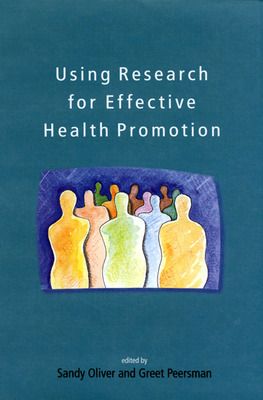Using Research for Effective Health Promotion
- Access the eBook anytime, anywhere: online or offline
- Create notes, flashcards and make annotations while you study
- Full searchable content: quickly find the answers you are looking for
Preface
Part one: Theory of health promotion and evaluation
Promoting health
principles of practice and evaluation
Evaluating health promotion
methodological diversity
Learning from research
Part two: Finding and appraising research evidence
Finding research evidence
systematic searching
World Wide Web for health
how to access tools and research
Critical appraisal of research evidence
finding useful and reliable answers
Systematic reviews of effectiveness
Part three: Applying health promotion and research to young people's lives
The fine details
conducting a systematic review
Who's listening?
systematically reviewing for ethics and empowerment
A listening trial
'qualitative' methods within experimental research
Part four: Advances in evidence-informed policy and practice
Using research
challenges in evidence-informed service planning
Making research more useful
integrating different perspectives and different methods
Looking to the future
policies and opportunities for better health
References
Index.
- Helen Roberts, Professor of Child Health, City University
This book bridges the gap between research and practice in health promotion. It advances evidence-based health promotion by illustrating how service providers and researchers can change their working practices to benefit the public. It addresses the need for health promotion services to be grounded in empirical research, and for research to focus on issues important to those delivering as well as those receiving the services.
Using Research for Effective Health Promotion advances the debate about the relative values of qualitative and experimental research in health promotion, and encourages an increased participation of service users in the development and evaluation of services. It provides health promotion specialists with time-saving tools to draw upon research quickly and critically; and is an important resource for students and professionals in fields such as public health, nursing, education, social work, and voluntary services.

